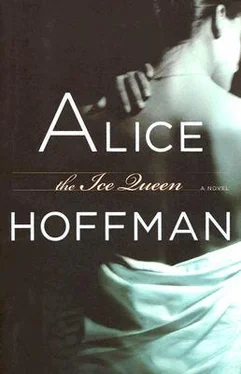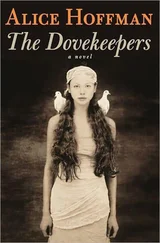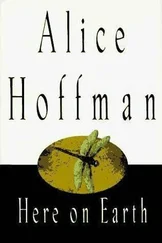I wished my mother would step out from between the hedges. I wished I could take back everything I’d ever done or said or wished. I would throw myself at her feet and ask her to forgive me. She’d be kind, I knew that. She was that way, and would be still. She’d tell me to stand up, to forgive and forget; she’d tell me she wasn’t one to hold a grudge. That her heart was open and always had been; that she was the same as she was, not a day older; that love didn’t change like the moon or tides, that it was the single constant in the universe.
But here was the thing — even if I did know her, I wasn’t certain she would recognize me. A strange woman in the dark, all grown up, standing in the grass, under the moon, beneath a cloud of bats, crying at a funeral for a leaf, a mole, a lost love, an idea.
“Well, that’s done,” my brother said.
He clapped the dirt from his hands and the bats came closer. “What’d I tell you. Poor schmucks. They’re drawn to sound.”
He knew I was crying, but was too polite to mention it. Just as I was too polite to suggest that his wife was someone he didn’t really know.
“Well, thanks,” I said. “I would have kept it forever.”
We laughed at the way I held on to things. I didn’t even like to throw out my garbage; I had a month’s worth of old newspapers stacked in the hall.
“Let go,” my brother told me.
“You first.”
Exactly what we used to say when we both wanted the same thing — the last cookie in the box, the last soda in the fridge.
We looked at the moon.
“Is it red?” I wanted to know.
“Any color you see is refracted by the water molecules in the air. It’s stone-colored, however it appears, kiddo. It’s gray.”
Regardless, it was certainly the most beautiful full moon of the year. In New Jersey it would be rising over birch trees, marshes turning brown, papers blowing down the sidewalks.
It was probably the color of a human heart.
“You’d be able to float if you were walking up there,” my brother told me.
I thought about that after Ned left to go home. I thought about how he’d called me in from the porch when my mother drove away and how I wouldn’t listen. Eventually, of course, I’d had no choice. My feet were freezing; they hurt. At last, I went inside. We were weightless that night. We had both stood at the window together, just for a second, side by side, seeing the very same thing for once in our lives: the long road away from our house, the dark horizon, the future, and everything it could bring.
I brought a candle with me when I next went to the orchard. How many women in how many stories had done this before? Mistrusted a lover, longed for an answer to a question that was not yet fully formed. If a secret was only unrealized knowledge, as my brother had said, what harm could it do? How dangerous could a tiny shred of truth be? It had no thorns, no talons, no teeth nor tail nor sting. Truth, sleeping on the other side of what I knew. Of course, there were a hundred versions of the same story: a woman who has to learn what she already knows, somehow, somewhere inside.
I’d brought matches as well. In my pocket, snug against my hip bone. It was a plan, not an accident. There was no chance involved, no circumstance. It was what I thought I wanted, needed, had to have. I had spent the day waiting for the dark, looking forward to it, the way bats must pine for the last bits of sunlight, green, gold, disappearing from sight. I’d dropped off my heart monitor, then stopped at Acres’ Hardware for the candles; I was in the notions aisle when I saw the man who’d been attacked by the bulldog, the patient my physical therapist had told me about. Bitten, torn apart, he was now shelving cans of paint. Even from a distance I could see the marks on his face, tooth and nail.
“I’ve got the Mandarin Orange,” he called to a customer, just as though he were unscarred. And maybe he was. He had managed to be the reverse of most people. In his case he showed the deep, dark riddle; inside, he might be as clear and pure as water.
I went home and waited for the end of the day. My stomach was jumpy. I couldn’t eat supper. Renny’s project was still in my kitchen. He phoned to check in and I swore we would finish the temple on Sunday; the due date of the project was Monday and without the temple Renny would surely fail. Well, failure was something I knew about. So I promised him, my one and only friend. I assured him we had time. It was Friday now. I had all night. All day tomorrow. Plenty of time to prove my doubts right or wrong.
The sky was even darker than usual, cloudy, no moon in sight. I drove out, my foot heavy on the gas pedal. Florida whirred past me, a dizzying globe. Heat and darkness, beetles hitting against the windshield. I used to walk home from the library in New Jersey feeling lost even though I knew my way. Now I felt found. I passed exits with names I didn’t know, towns I’d never been to, but I knew exactly where I was going. Gold and green and black, like a bat drawn to clapping hands in the darkness, against all logic, a love song it was impossible to understand.
He was waiting for me. That surprised me. I couldn’t imagine myself mattering to anyone. There was something suspicious in his desire for me. I saw him when I got out of my car, slammed the door shut, smelled oranges. There were moths in the night along with the beetles, and little gnats and mosquitoes. Something bit me and it hurt. I ran to the porch. I wanted to get this over with.
“Hey, you.” He rose from the old wooden bench left on the porch for fifty years or more. He was wearing a long-sleeved white shirt, jeans, old boots. I saw him shining there, like a star.
“Hey, you,” I said back.
“You’re late. I was going to make you some dinner.”
Just like normal people. He seemed to want that.
I went to him, reached my arms around him, stood on my toes, started to burn.
He backed away from me, looked into my face. It was just me. I leaned up and kissed him. Once, twice, then I had to stop.
“I missed you,” he said.
He kissed me again, hard.
Every fairy tale had a bloody lining. Every one had teeth and claws.
“Baby,” I said. I called him that. He was so beautiful, his hands, his ashy eyes, his throat, his everything.
“I could still make soup.” He’d opened the screen door for me. I thought I would probably always remember how it sounded. It was the opening into the after . It sounded like wind on a quiet night.
“I’m not hungry,” I said, the way a starving woman might, so as not to give herself away.
Into the dark hallway, past the coatrack, the jackets, the rain boots, all of it belonging to Seth Jones, whoever he was; Lazarus stopped, ran his hands over me, let me feel how he’d been missing me. It was all so strong, the way the before always is. The ice click-clacking on the plastic porch roof. The way your feet hurt after you stomp them and you’re barefoot.
“You know what I want,” I said. Said it to his face. He had no idea, of course, but he thought he did. Hoped he did. Kissed me to prove it. “I need a minute first,” I told him.
I went into the bathroom. My breathing was off. The huff and the puff of all liars, even those in search of the truth.
I ran the cold water in the tub and took off my clothes. I was standing there, looking in the mirror. My pixie hair had grown in. My skin was pale. I turned off the lights, turned off the tap. I didn’t want anything to scare him off, not a wash of light under the door, not any empty tub. I had the marks of the heart monitor on my skin. My heart skipped a beat, but the cardiologist had told me that was now its normal rhythm, abnormal.
Читать дальше












